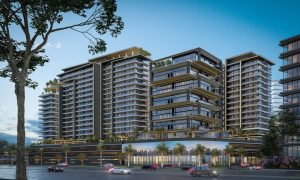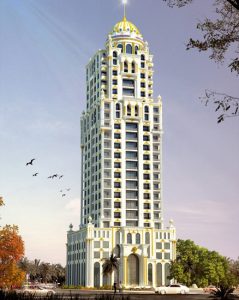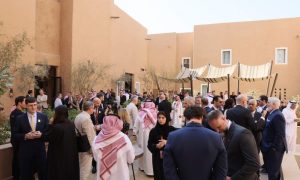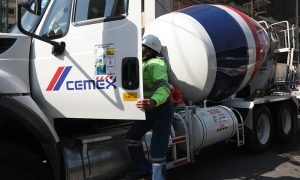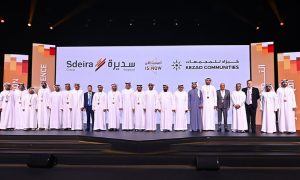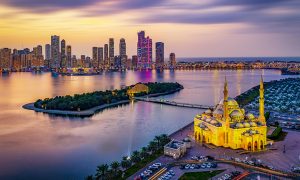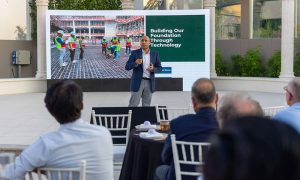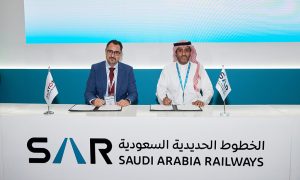Trust in engineering: Mouchel boss on surviving the downturn
Andrew Body, managing director of Mouchel, speaks to Big Project ME about why it’s crucial to keep your promises in a market undergoing tremendous change.

Back in 2009, in the wake of the financial crisis that hit Dubai, the Mouchel Group announced that it was shutting down its operations in Dubai and focusing on its business in the UAE capital. Given that the UK-owned engineering firm had a project list that included Dubai Festival City, Jumeirah Village South and Nakheel’s Dubai Waterfront, it’s easy to see why they came to such a drastic decision.
With some $47.15 million owed to it from various clients, it seemed certain that the consultant’s time in Dubai was over. In fact, given the situation at the time, it would have been no surprise to see the firm shut up shop completely.
Clearly this hasn’t been the case, and five years down the line, the situation has changed dramatically, with the Mouchel team now established as one of the most respected names in infrastructure development and design. This is borne out by its projects in the GCC, which include highways designed for major clients such as the Department of Transport in Abu Dhabi, Abu Dhabi Municipality, the Ministry of Transport in Saudi Arabia and Jeddah Municipality.
A large chunk of this turnaround can be attributed to the decision Mouchel made in 2012, when it appointed Andrew Body managing director of its Middle East business. Despite only arriving in 2008, at the height of the crisis, his vast experience and willingness to embrace a challenge proved crucial in turning around Mouchel’s fortunes.
“I arrived here in December 2008 – just as everything was very slow, let’s put it that way! I did about four years with Hyder Consulting. They were four really interesting years, but when the opportunity came up with Mouchel, I just thought it was a very exciting one. It’s a great brand – next year will be 40 years here in the GCC – but it was also a business that had been through times that were tougher than most thanks to the financial crisis,” he tells Big Project ME during an interview at his offices in Dubai’s Business Bay.
Having grown up in New Zealand, Andrew Body began his career working with the Ministry of Transport there. He then moved to a body associated with the Ministry, TransFund. Rising to the rank of policy manager there, he decided to move into the private sector. At this point, he joined Hyder Consulting and helped set up their New Zealand office.
Once operations there were running smoothly, Body decided to make the move overseas when the opportunity arose. That came about at the end of 2008, when he made the trip over to Dubai. Since then, he’s rarely looked back, as evidenced by his time at Mouchel.
“Look, I went in with my eyes wide open,” he says of his decision to join the firm in 2012. “It was a business that had been through some tough times, but what I saw was a business with a great technical legacy, with some really great technical people. It just needed a bit more of a strategic and business-like approach around it,” the genial Kiwi relates.
“But [what convinced me] was the vision of our chief executive, Grant Rumbles. Grant has spent a number of years based in the Middle East, so he’s really committed to this market and he can see how exciting this market can be. It was his excitement about the market and my belief that he would be strong and supportive of us as we tried to do what he wanted us to do that really pulled me towards Mouchel.”
Although the firm has approximately 7,000 employees worldwide, Middle East operations account for only 400. Despite the small numbers on the ground, Body insists there isn’t any inferiority complex. “If you look at us in terms of size in the Middle East, we’re still a reasonably small player compared to some of the organisations that are out there. But if you look at the scale of Mouchel all over – then we’re a 7,000-person business. That’s across the UK, the GCC and Australia.
“When you ask our clients where we rank compared to our competition in terms of our core areas of infrastructure design, they’d rank us right up there in the top tier of infrastructure consultants. We’ve more than doubled the size of the business over the last two years, and the aim is to do that again in the next two years. Once we achieve that, we’ll be up there with our competitors in the Middle East. While we may not have as many people in the region as some of the big firms, Mouchel is an organisation that is really well joined up. We have access to the 2,500 engineers that we have in the UK and they come out and work with us on projects all the time,” Body adds.
With the many opportunities available, he is adamant that his firm will soon be a dominant force in the region, but on its own terms. “You could just about turn yourself inside out chasing all the opportunities in the market, but in doing that you risk not being able to deliver. That’s one of the key things that we’re working on – to maintain our reputation – [and ensure] that we do what we say we’ll do.”
This philosophy has allowed Mouchel’s Middle Eastern operations to flourish since Body took over, and he’s quite clear about the responsibility placed upon him and his team by the head office in the UK.
“The thing I quite like about the way things are done here is that they’ve given us this business to run. If they think we’re not being aggressive enough, they’ll tell us. But we set our targets and we’re looking to grow by 50% [in 2015]. With our pipeline and with the contracts that we’re close to signing, I’m very confident that we’ll achieve that,” he insists.
By concentrating on what it is good at, Mouchel can develop strong and enduring relationships with its clients, Body points out. Focusing on a smaller number of clients in the public sector has allowed the firm to provide infrastructure services above and beyond what their competition may be offering.
“They’re [Mouchel’s clients] the people that are sitting there thinking, ‘I’ve got this big highway asset here, what am I going to do to make sure that I maintain its value for the next 50 or 60 years? How am I going to operate it in such a way that I’m going to get the best value out of it?’ It’s those clients that we’re working with and helping them to think about their strategies for managing their assets, and then developing the opportunities for them,” Body explains.
“We’re actually providing a lot of these services at the moment. For Abu Dhabi Municipality, we’re looking after the maintenance of the entire road network on the island of Abu Dhabi. We’re working with them to help achieve their vision of moving from a traditional maintenance-based operation to a more modern, integrated service like you see in some Western countries. For the Department of Transport in Abu Dhabi, we supervised the maintenance of 2,500km of roads in the Western Region.
“That market is the stuff that I find really exciting. Agencies here are seeing the value they get out of maintaining and operating their assets in an efficient way, but they’re also sitting there thinking that they could be doing a whole lot better,” he asserts.
Keeping this in mind, Mouchel’s business is structured around two distinct service lines: the infrastructure business, which is the core component of operations in the Middle East, and Transport Solutions.
“In that business, we’ve got transport planning, traffic engineering, intelligent transport systems and asset management. If you look at all areas of Intelligent Transport Systems and Asset Management, that’s where Mouchel will come out on top. We’re the number one highways provider in the asset management field in the UK, and probably the number one in terms of ITS. That’s another part of why I think that it’s an exciting time for Mouchel in the Middle East, and why it was interesting for me to join [when I did]. We’re seeing those parts of the market really start to move,” he insists.
Following the harsh lessons learnt in the wake of the crisis, Body says that Mouchel has been very careful about who they work with. He adds that consultants and contractors have also become wiser and cagier about how they go about their business.
“The clients we’re working with, they’re working in a much more structured way. They do have these magnificent visions, but they’re not looking to build it all at once. They’ll develop their master plans and then they’ll work with us to identify how to do it in a staged, financially viable way.
“Most consultants and contractors have understood that if it looks too good to be true, then it probably is! There’s an understanding that while relationships out here are still absolutely important – if not paramount – what is also very important is internal commercial control and making sure that you have the right contractual arrangements,” he says.
As construction work in the GCC picks up steam ahead of the major events coming up in the next decade, contractors and consultants are going to be facing myriad challenges, Body warns. Chief amongst these challenges is keeping the right staff in place. With plans for a major recruitment drive in place for 2015, Body is acutely aware of the task ahead of him and his executive team at Mouchel Middle East.
“Retaining good people at all levels of the organisation is a critical focus for us at the moment. I think that one of the things the industry can’t do is go back to what it was doing a while back, where insane salaries were being offered and people were just moving around. It just inflates prices everywhere.
“We’re recruiting heavily, both here in the region as well as having a very structured programme to bring some long-term Mouchel people to the region, out from the UK. I think that’s one of the key differentiators. To clients here, being a strong international company only means anything if you’re bringing in strong international people to work on their projects. There are lots of consultants here who say that they will and then don’t do it. We’re looking to make sure that we do. We’re looking to recruit a couple of hundred people this year,” he claims.
The firm is also looking to its UK operations as a guide to conducting its business, Body reveals. By this, he means using the existing supply chain in the UK and Australia to leverage expertise for projects in the GCC. Despite these ambitious plans, the man from Mouchel remains realistic ahead of what promises to be a challenging 2015. He insists that his firm will remain true to its strategy, rather than overreaching and overextending itself.
“It’s about us being clear in our strategy. We didn’t chase the Metro job in Riyadh, for instance. Mouchel can’t stand up and say that 1,200 people are going to be designing metros in Riyadh. But we certainly have a comparable level of resources to design the highways we’re designing for the Ministry of Transport in Saudi Arabia or in Abu Dhabi.
“Yes, we want to continue growing, but I think that when you get to a certain size – and we’re already there – your client looks at you and thinks, ‘I believe that they can look after me.’ But they only get worried about that if you’re not looking after them in the first place,” he insists.
“That’s the core of our strategy. It’s about client centricity and building great relationships. It’s about doing what we said we’ll do. If we keep doing that, we’ll be fine.”
